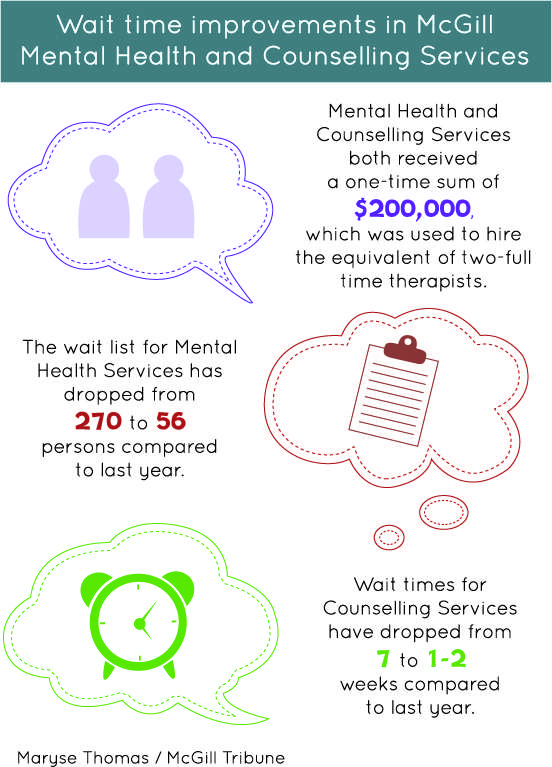Wait times for students accessing McGill’s Mental Health Clinic and Counselling Clinic have been reduced dramatically due to an increased $400,000 of funding in the Fall of 2013.
In comparison to this time last year, the waitlist for Mental Health Services has decreased from 270 to 56 persons, while wait times for Counselling Services have decreased from seven weeks to one or two weeks.
The injected funds derive from a $5 million surplus within the Student Services Contingency Fund, which accumulated due to various factors including savings in wages from the 2012 MUNACA strike and conservative student enrolment numbers. According to Executive Director of Student Services Jana Luker, both services were given $200,000 each to address extreme situations.
“We recognized that counselling was a crisis, and that it was acute and it was wrong; it bothered everybody a lot,” Luker said. “The only reason Student Services is here is to help students and support students and we weren’t able to do that in a timely manner.”
In order to reduce the wait times, both clinics hired the equivalent of two full-time therapists.
“We had the funds for two full time equivalents; it ended up being more than two people but part-time,” Vera Romano, director of Counselling Services, explained.
Luker said new technology-based applications are also expected to help keep wait times low.
“There’s a bunch of [online and mobile] apps we are trying to use to treat people with anxiety and depression,” Luker said. “Anxiety doesn’t always show itself conveniently between nine to five, Monday to Friday. We are trying to see if we can teach people simple methods of treating their own anxiety [….] Then you won’t see people in an acute phase lining up later on.”
In addition, Romano attributes the reduction in wait times to initiatives by other members of the McGill community such as students and the administration.
“The response to the crisis I think on some level was coming together and prioritizing the mental health issues, the psychological issues, the wellness issues by the students especially, by the professional service deliverers—which is us, and—I think by the admin,” Romano said.

While the additional funds are having an impact this semester, they are a one-time source of funding, which means the services will need to find alternative methods of funding to keep wait times low in future years.
Rather than redistribute student services fees and take away funds from other significant services, Luker suggested the option increasing of Student Services fees to hire new therapists permanently. Currently students pay $549 per year towards Students Services.
“We won’t do [it] this year; we would have to take it to referendum,” Luker said. “If students knew that an increase in Student Services fees—an extra $10 per person—would go directly to hiring two more therapists, then the students could decide for themselves.”









